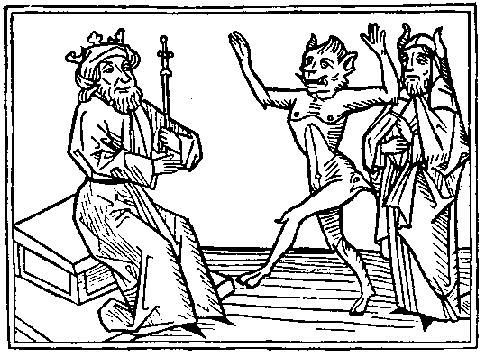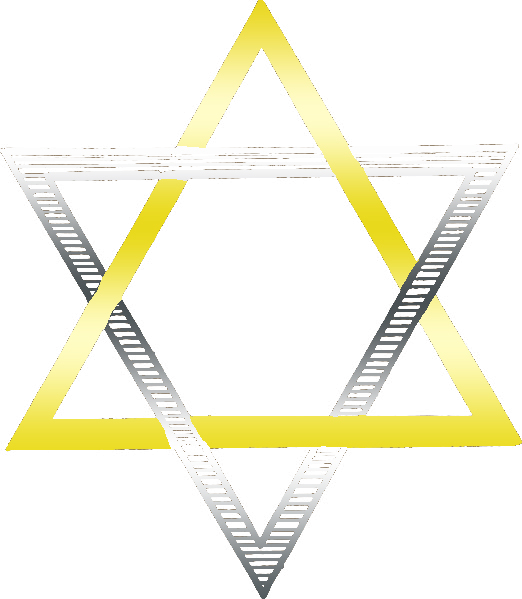Testament of Solomon

The Testament of Solomon is a pseudepigraphical composite text ascribed to King Solomon but not regarded as canonical scripture by Jewish or Christian groups.
The book was written in the Greek language, based on precedents dating back to the early 1000AD, but was likely not completed in any meaningful textual sense until sometime in the medieval period. In its most noteworthy recensions, the text describes how Solomon was enabled to build his temple by commanding demons by means of a magical ring that was entrusted to him by Archangel Michael.
Contents

The key narrative of the testament is a story about a demon named Ornias harassing a young man by stealing half of his pay and sucking out his vitality through the thumb on his right hand. In response, Solomon prays in the temple and receives from Archangel Michael a ring with the seal of God (in the shape of a pentagram) on it which will enable him to command the demons. Solomon lends the ring to the lad who, by throwing the ring at the demon Ornias, stamps him with the seal and brings him under control. Then Solomon orders the demon Ornias to take the ring and similarly imprint the prince of demons, Beelzebul.
With Beelzebul under his command, Solomon now has all of the demons at his bidding to build the temple. Beelzebul reveals that he was formerly the highest ranking angel in Heaven.
Then Ephippas and another demon from the Red Sea bring a miraculous column made of something purple (translation obscure) from out of the Red Sea. This Red Sea demon reveals himself as Abizithibod, and claims to be the demon who supported the Egyptian magicians against Moses, and who hardened the pharaoh's heart, but had been caught with the Egyptian host when the sea returned and held down by this pillar until Ephippas came and together they could lift it.
There follows a short conclusion in which Solomon describes how he fell in love with a Shunammite woman, and agreed to worship Remphan and Moloch in exchange for sex. Solomon agrees to sacrifice to them, but at first only sacrifices five locusts by simply crushing them in his hand. Immediately, the spirit of God departs from him, and he is made foolish and his name becomes a joke to both humans and demons. Solomon concludes his text with a warning to the readers; he tells them to not abandon their beliefs for sex like he did.
36 decans
In chapter 18, the demons of the 36 Egyptian decans appear, with names that sometimes seem to be conscious distortions of the traditional names for the decans. The decan demons claim responsibility mostly for various ailments and pains, and they provide the magical formulae by which they may be banished. For example, the thirty-third demon is Rhyx Achoneoth who causes sore throat and tonsilitis and can be driven off by writing the word Leikourgos on ivy leaves and heaping them into a pile.
Influences
The Babylonian Talmud (in Gittin 68) mentions a similar story where Solomon enslaves Ashmodai, Prince of the Demons, to build the Temple, and he was disposed of temporarily by him.
The most obvious Greek influence is Solomon's encounter with seven demons who are sisters. They introduce themselves to the king and describe their home among the stars and Mount Olympus. The seven demon-sisters represent the Pleiades of Greek mythology and their astrological relationship.
The demon Enepsigos recounts to King Solomon at one point during the temple's construction that he can take three different physical forms, one of which being the Greek Titan Kronos. Enepsigos is also represented as a triple-faced woman akin to Hecate and is likewise astrologically associated with the sphere of the moon.
Solomon also encounters a female demon called Obizuth, who has no limbs and a head full of disheveled hair, this is likely a reference to the Egyptian decans, which were commonly known as "the disheveled" because their hair had been messed by the sun god Rē when he grabbed them after their rebellion.
Demons
Many of the demons in Solomon's encounters are of Greek, Egyptian, Jewish, Christian, Arabic, and other traditions. The majority of the testament consists of Solomon's interviews with the demons, some of which are grotesque, including one which has no head. Most of the demons are otherwise unknown by name from other works. The demon Abezethibou is said to have hardened the pharaoh's heart, rather than Yahweh.
The demons, listed in order of appearance, are Ornias, Beelzeboul, Onoskelis, Asmodeus, Tephras, the 7 star sisters (a reference to the Pleiades), Envy, Rabdos, Rath, Tribolaios, Obizuth, the wingdragon, Enepsigos, Kunopaston, an unnamed "lustful spirit", the 36 spirits of the decans, Ephippas, Abizithibod.